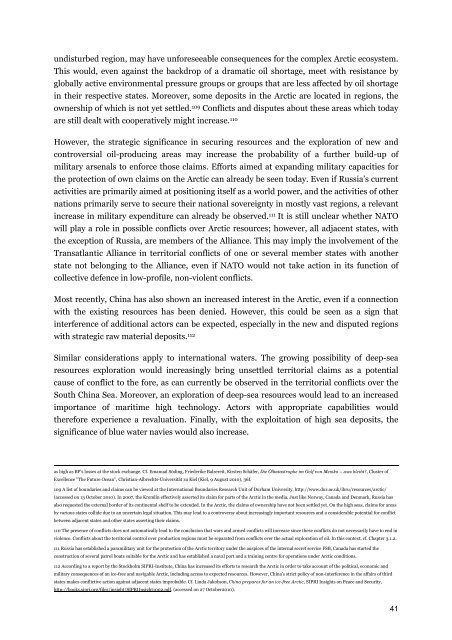PEAK OIL
PEAK OIL
PEAK OIL
Create successful ePaper yourself
Turn your PDF publications into a flip-book with our unique Google optimized e-Paper software.
undisturbed region, may have unforeseeable consequences for the complex Arctic ecosystem.<br />
This would, even against the backdrop of a dramatic oil shortage, meet with resistance by<br />
globally active environmental pressure groups or groups that are less affected by oil shortage<br />
in their respective states. Moreover, some deposits in the Arctic are located in regions, the<br />
ownership of which is not yet settled. 109 Conflicts and disputes about these areas which today<br />
are still dealt with cooperatively might increase. 110<br />
However, the strategic significance in securing resources and the exploration of new and<br />
controversial oil-producing areas may increase the probability of a further build-up of<br />
military arsenals to enforce those claims. Efforts aimed at expanding military capacities for<br />
the protection of own claims on the Arctic can already be seen today. Even if Russia’s current<br />
activities are primarily aimed at positioning itself as a world power, and the activities of other<br />
nations primarily serve to secure their national sovereignty in mostly vast regions, a relevant<br />
increase in military expenditure can already be observed. 111 It is still unclear whether NATO<br />
will play a role in possible conflicts over Arctic resources; however, all adjacent states, with<br />
the exception of Russia, are members of the Alliance. This may imply the involvement of the<br />
Transatlantic Alliance in territorial conflicts of one or several member states with another<br />
state not belonging to the Alliance, even if NATO would not take action in its function of<br />
collective defence in low-profile, non-violent conflicts.<br />
Most recently, China has also shown an increased interest in the Arctic, even if a connection<br />
with the existing resources has been denied. However, this could be seen as a sign that<br />
interference of additional actors can be expected, especially in the new and disputed regions<br />
with strategic raw material deposits. 112<br />
Similar considerations apply to international waters. The growing possibility of deep-sea<br />
resources exploration would increasingly bring unsettled territorial claims as a potential<br />
cause of conflict to the fore, as can currently be observed in the territorial conflicts over the<br />
South China Sea. Moreover, an exploration of deep-sea resources would lead to an increased<br />
importance of maritime high technology. Actors with appropriate capabilities would<br />
therefore experience a revaluation. Finally, with the exploitation of high sea deposits, the<br />
significance of blue water navies would also increase.<br />
as high as BP's losses at the stock exchange. Cf. Emanual Söding, Friederike Balzereit, Kirsten Schäfer, Die Ölkatastrophe im Golf von Mexiko – was bleibt?, Cluster of<br />
Excellence "The Future Ocean", Christian-Albrechts-Universität zu Kiel (Kiel, 9 August 2010), 36f.<br />
109 A list of boundaries and claims can be viewed at the International Boundaries Research Unit of Durham University, http://www.dur.ac.uk/ibru/resources/arctic/<br />
(accessed on 13 October 2010). In 2007, the Kremlin effectively asserted its claim for parts of the Arctic in the media. Just like Norway, Canada and Denmark, Russia has<br />
also requested the external border of its continental shelf to be extended. In the Arctic, the claims of ownership have not been settled yet. On the high seas, claims for areas<br />
by various states collide due to an uncertain legal situation. This may lead to a controversy about increasingly important resources and a considerable potential for conflict<br />
between adjacent states and other states asserting their claims.<br />
110 The presence of conflicts does not automatically lead to the conclusion that wars and armed conflicts will increase since these conflicts do not necessarily have to end in<br />
violence. Conflicts about the territorial control over production regions must be separated from conflicts over the actual exploration of oil. In this context, cf. Chapter 3.1.2.<br />
111 Russia has established a paramilitary unit for the protection of the Arctic territory under the auspices of the internal secret service FSB, Canada has started the<br />
construction of several patrol boats suitable for the Arctic and has established a naval port and a training centre for operations under Arctic conditions.<br />
112 According to a report by the Stockholm SIPRI-Institute, China has increased its efforts to research the Arctic in order to take account of the political, economic and<br />
military consequences of an ice-free and navigable Arctic, including access to expected resources. However, China's strict policy of non-interference in the affairs of third<br />
states makes conflictive action against adjacent states improbable. Cf. Linda Jakobson, China prepares for an ice-free Arctic, SIPRI Insights on Peace and Security,<br />
http://books.sipri.org/files/insight/SIPRIInsight1002.pdf, (accessed on 27 October2010).<br />
41


